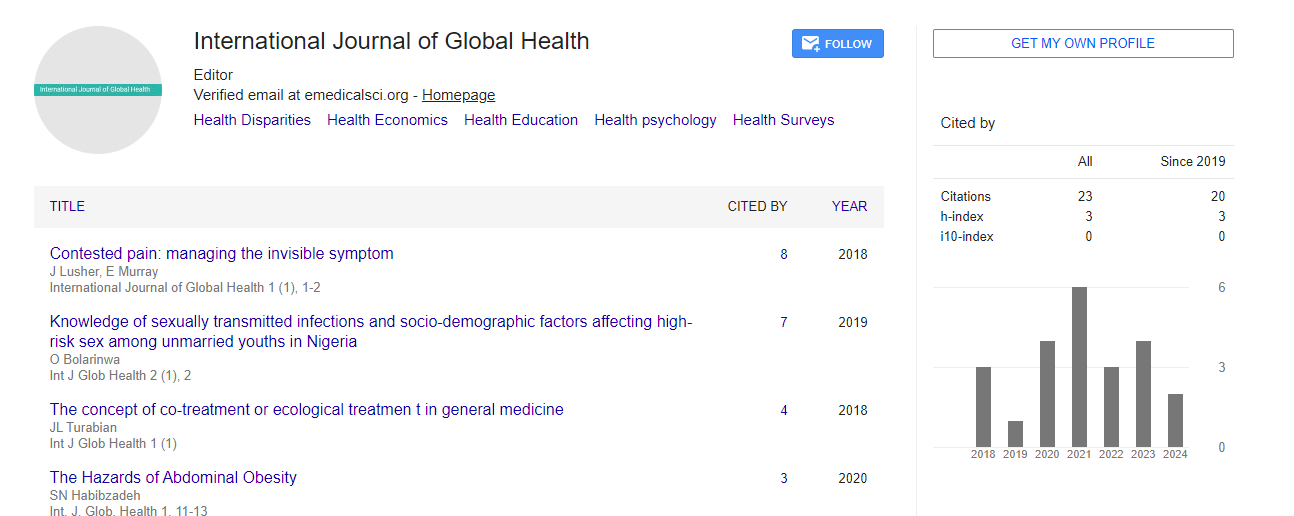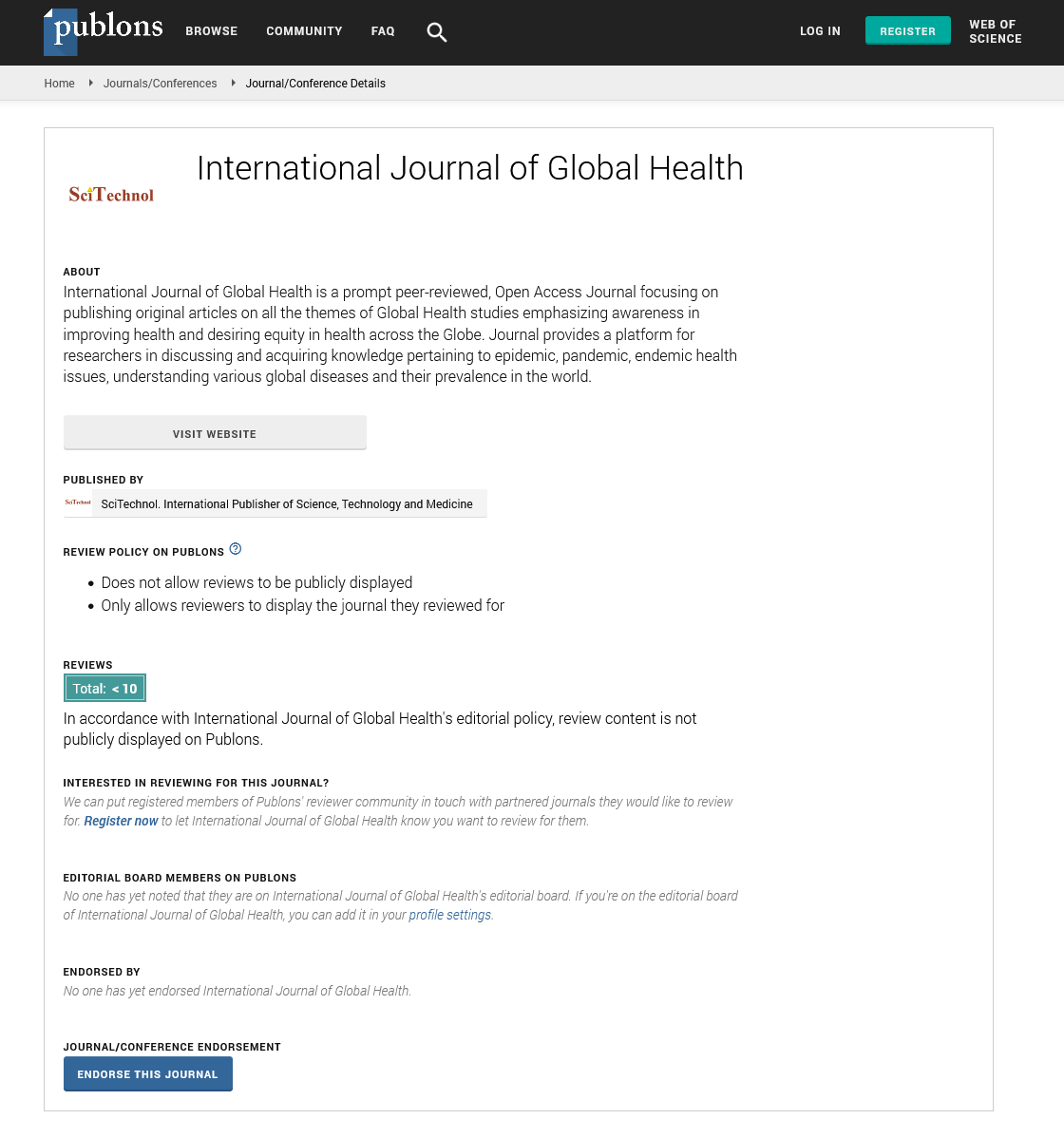Perspective, Int J Glob Health Vol: 7 Issue: 3
Empowerment and Acceptance: Addressing Body Image in Poly-Cystic Ovarian Syndrome
Anne E. Kim*
1Department of Gynaecology, University of Pennsylvania, Philadelphia, Pennsylvania, United States of America
*Corresponding Author: Anne E. Kim,
Department of Gynaecology, University of
Pennsylvania, Philadelphia, Pennsylvania, United States of America
E-mail: anne.kim@upenn.edu
Received date: 26 August, 2024, Manuscript No. IJGH-24-148990;
Editor assigned date: 28 August, 2024, PreQC No. IJGH-24-148990 (PQ);
Reviewed date: 11 September, 2024, QC No. IJGH-24-148990;
Revised date: 18 September, 2024, Manuscript No. IJGH-24-148990 (R);
Published date: 25 September, 2024, DOI: 10.4172/Ijgh.1000210.
Citation: Kim AE (2024) Empowerment and Acceptance: Addressing Body Image in Poly-Cystic Ovarian Syndrome. Int J Glob Health 7:3.
Abstract
Description
Polycystic Ovary Syndrome (PCOS) is a common endocrine disorder affecting women of reproductive age, characterized by a range of symptoms, including irregular menstrual cycles, hirsutism, acne and weight gain. While the physiological aspects of PCOS are welldocumented, the psychological ramifications particularly regarding body image are increasingly recognized as perilous components of the condition. This study discovers how body image issues manifest in women with PCOS, their implications for mental health and strategies for addressing these concerns. Body image refers to an individual's perception of their physical self and the thoughts and feelings that arise in response to that perception. For women with PCOS, body image issues often stem from visible symptoms such as weight gain, excessive body hair and skin changes.
Research indicates that these symptoms can lead to a negative body image, characterized by dissatisfaction, low self-esteem and feelings of inadequacy. Studies have shown that women with PCOS are at a heightened risk for developing body image disturbances. A survey published in the Journal of Clinical Endocrinology & Metabolism found that approximately 60-70% of women with PCOS report dissatisfaction with their appearance. This dissatisfaction can be exacerbated by societal beauty standards that prioritize thinness and conventional femininity, leading to a sense of alienation and social anxiety.
Psychological implications
Impact on self-esteem: The relationship between body image and self-esteem is well established. Women with PCOS often experience reduced self-esteem due to negative body image, which can manifest in various ways, including withdrawal from social activities and avoidance of intimate relationships. The fear of judgment based on appearance can lead to social anxiety and a reluctance to engage in situations where physical appearance is highlighted.
Mental health concerns: Negative body image is closely linked to mental health disorders. Research indicates that women with PCOS are at an increased risk for anxiety and depression. The chronic stress of managing visible symptoms, combined with societal pressures, can exacerbate these conditions. A study in the Journal of Psychosomatic Obstetrics & Gynecology found that women with PCOS reported higher levels of anxiety and depressive symptoms compared to those without the condition.
Eating disorders: Body image issues can also contribute to disordered eating behaviors. Women with PCOS may engage in unhealthy weight control methods, such as extreme dieting, binge eating, or purging, in an attempt to conform to societal ideals. The interplay between PCOS, body image and eating disorders is complex, requiring careful management to address both physical and psychological health.
Coping mechanisms and strategies
Promoting body positivity: Encouraging body positivity can help mitigate the negative effects of body image issues. Body positivity emphasizes self-acceptance and appreciation for one's body, regardless of societal standards. Support groups and community initiatives that promote body positivity can provide women with PCOS a platform to share their experiences and promote self-acceptance. Cognitive- Behavioral Therapy (CBT) has shown promise in addressing body image issues in women with PCOS. CBT focuses on challenging negative thought patterns and replacing them with more positive, realistic beliefs about oneself. Incorporating mindfulness techniques can also enhance self-compassion and promote a healthier relationship with one's body
Education and awareness: Raising awareness about PCOS and its symptoms is vital for combating stigma and promoting understanding. Educational initiatives can empower women to recognize that PCOS is a medical condition and not solely a reflection of personal health choices. Accurate information can help reduce feelings of isolation and promote community support.
Role of healthcare providers: Healthcare providers play a vital role in addressing body image issues in women with PCOS. Training healthcare professionals to recognize the psychological aspects of PCOS can facilitate early intervention. Routine assessments of mental health should be incorporated into the management of PCOS, allowing for a comprehensive approach to care. Providers should promote a supportive and non-judgmental environment where patients feel comfortable discussing body image concerns. This includes using sensitive language and avoiding assumptions about lifestyle choices based solely on appearance.
Conclusion
Body image issues are a significant concern for women with polycystic ovary syndrome, affecting their self-esteem, mental health and overall quality of life. By understanding the relation between PCOS and body image, we can implement effective strategies to support these individuals. Promoting body positivity, providing therapeutic interventions and promoting awareness can empower women with PCOS to embrace their bodies and improve their mental well-being. A comprehensive approach to managing PCOS must address not only the physical symptoms but also the psychological challenges, paving the way for a healthier, more fulfilling life.
 Spanish
Spanish  Chinese
Chinese  Russian
Russian  German
German  French
French  Japanese
Japanese  Portuguese
Portuguese  Hindi
Hindi 
